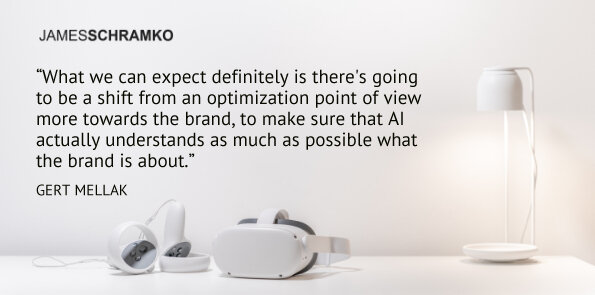Podcast: Download (Duration: 25:31 — 24.1MB)
Get Notified Of Future Episodes Apple Podcasts | Spotify | Amazon Music | Android | Blubrry | Gaana | TuneIn | Deezer | Anghami | RSS | More
James has been talking a lot about AI with experts in various fields – traffic, copywriting, teams. And this time he’s brought on Gert Mellak of SEO Leverage to discuss the applications of AI for SEO.
James and Gert will talk about the current roles of artificial intelligence in SEO.
They’ll speak on the importance of AI prompt engineering.
And they’ll address an aforementioned query on the show: will AI replace writers?
Table of contents
1. Where AI was and where it’s at
2. It’s not a magic wand
3. Where 50 articles is no longer a lot
4. The thing ChatGPT lacks
5. What AI can do for ecommerce
6. Will Google punish you for using AI?
7. Could Bing be coming back?
8. The search experience versus ChatGPT
9. What it means for writers
10. The takeaway from this episode
Where AI was and where it’s at
At date of recording, the use of AI is becoming more mainstream in businesses, with some companies already using it for content creation.
Google and other search engines have already been using AI to improve the search engine user experience, without talking much about it. AI has been present in search engines’ autofill suggestions and email programs’ auto responses, and is expected to become even more prevalent in various devices and apps.
James is of the opinion that AI is overhyped, with some people, in his words, mucking around too much with stuff that is distracting them from what’s really important in their business.
Gert believes it will become something that we take for granted in our daily life. We will come to expect it’s there, when we write an email, when we open a Word document, and so forth.
And the applications, not just in content creation but in video and image creation, are getting better and better. He’s excited to see where it is in six months.
SEO as a result has changed, but it’s interesting too, says Gert, to see that certain things don’t change.
It’s not a magic wand
At the same time, it’s important to recognize that AI is not a magic solution. It requires good prompt engineering and the ability to judge the quality of outputs.
Creating topical relevance, or topical authority, through strategic content creation is important for SEO, and AI tools can help in this process. However, creating high-quality content that covers a specific topic requires input from humans and is not something that can be easily automated.
It is essential to understand the limitations of AI and use it as a tool rather than a replacement for human input and expertise.
Where 50 articles is no longer a lot
In the age of AI-generated content, says Gert, creating 50 articles for a client is no longer considered a lot, as it is possible to provide clients a detailed outline that they can fill in themselves. This removes the waiting game of traditional article creation and streamlines the process for both the client and content creators.
Gert actually ran a test on a local website, and found that strategically placed, positioned, and optimized content started ranking just in a couple of weeks. This could do wonders for a business in a non-competitive market, or in a niche within a competitive market.
The thing ChatGPT lacks
Now the caveat with ChatGPT is the AI lacks creativity. It needs someone to add something unique to content creation, such as a personal story or an alternate methodology.
Gert and James highlight the importance of training AI using examples and prompts. The possibilities, however, are huge – James just recently demonstrated to his father how the technology could help him write a book, if he would just provide prompts and fill in the gaps with personalized stories.
What AI can do for ecommerce
One benefit James can see from AI – and Gert agrees – would be in generating creative and unique product descriptions for e-commerce stores. These online shops often just copy and paste manufacturer descriptions, leading to duplicate content that doesn’t rank well.
With AI, stores could extract key takeaways and characteristics from the manufacturer description and use them to create unique and sales-focused product descriptions. While a human touch is still necessary, the technology could significantly speed up the process.
Will Google punish you for using AI?
Is there a risk of Google penalizing AI-created content?
Gert says it’s probably not as much of an issue as initially thought.
Google has been using and ranking AI-generated content for a long time, such as sports reports, stock prices, and company information directories. The focus should be on adding additional value to the content, rather than just copying and rewriting what’s already out there.
Google will likely accept the existence of both low-quality content and high-quality content where their AI can determine added value.
Could Bing be coming back?
James is curious – could Microsoft’s involvement with ChatGPT mean that Bing is in for a comeback? And is there a chance people could stop using Google in favor of an AI tool like ChatGPT?
While Gert does not believe Bing will take over, he does expect user behavior to adjust, similar to what James has experienced, that he now consults ChatGPT about as much as he does Google.
And Gert sees SEO optimizations shifting towards brand awareness, towards making sure the AI understands as much as possible what a brand is about.
Gert does suggest that Bing may be more aggressive in putting things out, while Google is more cautious due to possible brand issues, should the AI produce biased or inappropriate content. James notes that ChatGPT is already limited in its output regarding some areas such as pandemics, vaccines, politics, and gender topics.
The search experience versus ChatGPT
James’s likens ChatGPT’s ability to iterate and refine results with that of Siri or Google. While it’s useful for some use cases, it’s not the same experience as the traditional search experience that people are used to with Google – people generally don’t want to do iterations when searching for something.
Additionally, says Gert, the accuracy of ChatGPT’s results is not always reliable, and it helps to ask for the source to get more accurate information.
What it means for writers
In terms of article writing, what could AI tools mean, asks James? Do we still need article writers?
In Gert’s opinion, junior writers will no longer have a place in the industry.
James agrees. The AI is already at the capability of about a university graduate.
However, says Gert, expert writers will still have a job, especially those who can evaluate AI content in a particular field. Writers need to upskill and embrace AI as a tool to be more efficient and creative in the writing process, and to make content sound like their clients’ brand voice.
VAs, James thinks, are still needed in businesses to augment and use AI tools, and learn business values and mission, which will help them grow into the team. And AI cannot replace VAs yet in tasks such as going through content, sending out an email broadcast, answering a support ticket properly, or doing bookkeeping effectively.
The takeaway from this episode
James and Gert summarize the episode thus: AI has changed content creation and can improve efficiency, speeding up the research and development process. It’s important, however, to have an overall strategy as a guide, and a human operator to validate the final output.
They also note that simply generating random traffic is not enough and conversion-focused efforts are necessary to achieve desired SEO results.
If you’d like to leverage Gert’s expertise with SEO, look him up at SEOLeverage.com. You can book a call, have a chat with Gert, talk action plans, and see if it’s a good fit.
Liked the show? Leave us a review on iTunes











Leave a Reply